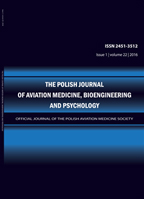2016, Volume 22, Issue 2
Obesity-Related Self-Esteem and its Relationship to Coping with Stress
Andrzej NIEŚPIAŁOWSKI1, Jan F. TERELAK2
-------------------------------------------------------------------------------------------------
1Institute of Psychology, Cardinal Stefan Wyszynski University in Warsaw
2Military Institute of Aviation Medicine in Warsaw
Autor korenspondencyjny: Andrzej NIEŚPIAŁOWSKI; Institute of Psychology, Cardinal Stefan Wyszynski University in Warsaw; email: niespiall14[at]gmail.com
Full text
Streszczenie
Introduction: The aim of this work was to determine the relationship between self-esteem and styles of coping with stress in obese people.
Methods: We included 62 adults with both obesity and with normal weight (men and women). Participants were qualified to either group based on their Body Mass Index values. We performed the assessments with the use of Rosenberg Self-esteem Scale (SES) and Coping Inventory for Stressful Situations (CISS) by Endler and Parker.
Results: Based on our statistical analyses, the assumption that obese people had a lower level of self-esteem in comparison to people with normal weight was confirmed. Moreover, the most commonly used coping style in people with obesity was emotion-oriented. Based on further statistical analysis, low self-esteem was a significant predictor of both the emotionoriented and the avoidance-oriented coping style in the form of distraction (DIS).
Discussion: Regulation and protection of cognitive resources from the influence of obesityrelated stress is reflected by the concentration on negative emotions and external compensatory behaviors aimed at mentally escaping from the non-acceptable body image.
Conclusion: It was found that obese people are characterized by a lower level of self esteem than people with normal weight. Moreover, obese people prefer emotion-oriented and avoidance-oriented coping styles and rarely use task-oriented coping.
Słowa kluczowe
obesity, self-esteem, coping stress
